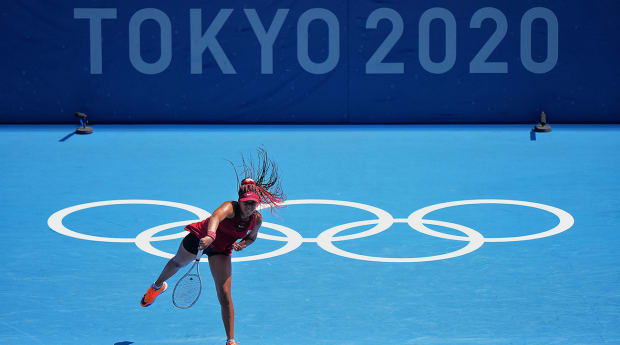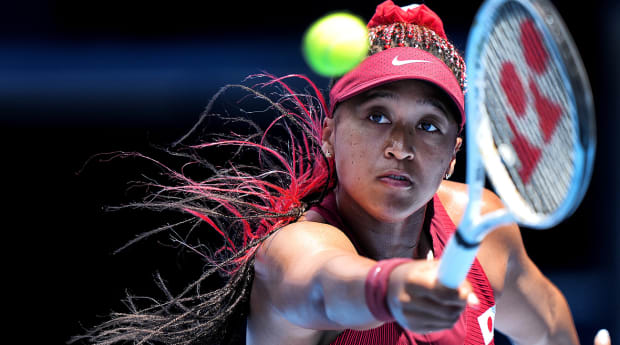After stepping away from the sport to focus on her mental health, the four-time Grand Slam champion returned to the spotlight with a dominant win at the Olympics.
TOKYO — First, Naomi Osaka did the easy part, beating one of the top 60 tennis players in the world, and then she did what is apparently the hard part: Talk about it.
Osaka famously put her career on pause this spring so she could focus on her mental health. The trigger for that decision, at least publicly, was the insistence from French Open organizers that she speak at press conferences after her matches. Osaka asked out. Organizers pushed her back in. She then withdrew from the tournament before her second-round match. This weekend, she came back to public life in just about the most high-profile way possible, short of a match on the moon: She lit the Olympic cauldron Friday night, then competed for Japan in the Tokyo Games.
Osaka’s return to her sport and the world stage was both banal (an easy win in a fan-less stadium) and momentous. That was fitting for an athlete who became even more famous when she stopped playing. The big question was not whether she would win, but whether she would take questions afterward. She was obligated to walk through the mixed zone but not obligated to stop and talk. She chose to talk.

Her session was brief and unremarkable, which is what made it so strange. She briefly stopped and answered two benign questions, then moved along to a cluster of American reporters. A moderator immediately said, “Hey guys, two questions.” The first was about how Osaka felt about talking to us again, and she said this:
“For me, honestly I don't feel that weird about it. It might feel weird to you guys, but I don't know ... I'm happy that, I guess, you guys are asking me questions. But more than anything, I'm just focused on playing tennis and I guess I feel a little bit out of my body right now.”
If she didn’t feel that weird about it, why didn’t she talk longer? It’s a mystery. Mixed-zone sessions are supposed to last no more than 90 seconds at these Games because of COVID-19 protocols, but like many rules here, that one is sporadically enforced. The next question (mine, if that matters) was when had she found out that she would light the cauldron and what did it mean to her. At first, she wasn’t sure she was allowed to share the timing, but then she was told she could. She has known since March.
“I was definitely very, very happy and honored,” she said.
And she was whisked away.
There was no indication that this exchange was either stressful to her or a relief. But it could have been either. Osaka does not have to share every emotion with the world. That could well be damaging to her well-being.
Osaka became an oddly controversial figure by not playing. She shouldn’t be. She is the victim of two unattractive American tendencies: To view everything through politics, and to talk when we should listen.

Osaka has publicly supported the Black Lives Matter movement, and her reluctance to fulfill traditional media obligations has given the American right an opening to paint her as a whiny, hypocritical liberal. Last week, former Fox News personality Megyn Kelly mocked Osaka for posing for magazine covers, including SI’s Swimsuit Issue, while supposedly addressing her mental health privately. Osaka fired back that the covers were shot months ago.
If you give this 10 seconds of thought, you will see that criticizing Osaka makes no sense. She withdrew from the French Open rather than continue her battle to skip press conferences. She then withdrew from Wimbledon. You might have heard of those events. The best players in the world generally prefer to play in them! The fact that Osaka withdrew should tell you that she isn’t just trying to duck the tennis media, which by her own admission has generally treated her pretty well.
Osaka is an incredibly popular player and a mesmerizing athlete. She overwhelmed 52nd-ranked Zheng Saisai here Sunday with her usual power and skill. Top-ranked Ashleigh Barty lost in straight sets on the same court an hour before, and with the matches on hard courts, Osaka’s favorite surface, she should now be the favorite to win gold. Whatever is happening in her head is probably complicated and entirely her business. She can share it if she wants. But our reaction should be quite simple: Wish her the best, and hope to see—and hear—her a lot.
More Olympic Coverage:
• Nyjah Huston Falls Short in Olympic Skateboarding Debut
• Kolohe Andino Is More Ready Than Ever for Surfing's Olympic Debut
• Chase Kalisz, Jay Litherland Set Off a Tidal Wave of Medals for U.S. Swimming
• The "Vending Machine Life:" A Japanese Staple and One Too-Many-Purchases
After stepping away from the sport to focus on her mental health, the four-time Grand Slam champion returned to the spotlight with a dominant win at the Olympics.
TOKYO — First, Naomi Osaka did the easy part, beating one of the top 60 tennis players in the world, and then she did what is apparently the hard part: Talk about it.
Osaka famously put her career on pause this spring so she could focus on her mental health. The trigger for that decision, at least publicly, was the insistence from French Open organizers that she speak at press conferences after her matches. Osaka asked out. Organizers pushed her back in. She then withdrew from the tournament before her second-round match. This weekend, she came back to public life in just about the most high-profile way possible, short of a match on the moon: She lit the Olympic cauldron Friday night, then competed for Japan in the Tokyo Games.
Osaka’s return to her sport and the world stage was both banal (an easy win in a fan-less stadium) and momentous. That was fitting for an athlete who became even more famous when she stopped playing. The big question was not whether she would win, but whether she would take questions afterward. She was obligated to walk through the mixed zone but not obligated to stop and talk. She chose to talk.

Her session was brief and unremarkable, which is what made it so strange. She briefly stopped and answered two benign questions, then moved along to a cluster of American reporters. A moderator immediately said, “Hey guys, two questions.” The first was about how Osaka felt about talking to us again, and she said this:
“For me, honestly I don't feel that weird about it. It might feel weird to you guys, but I don't know ... I'm happy that, I guess, you guys are asking me questions. But more than anything, I'm just focused on playing tennis and I guess I feel a little bit out of my body right now.”
If she didn’t feel that weird about it, why didn’t she talk longer? It’s a mystery. Mixed-zone sessions are supposed to last no more than 90 seconds at these Games because of COVID-19 protocols, but like many rules here, that one is sporadically enforced. The next question (mine, if that matters) was when had she found out that she would light the cauldron and what did it mean to her. At first, she wasn’t sure she was allowed to share the timing, but then she was told she could. She has known since March.
“I was definitely very, very happy and honored,” she said.
And she was whisked away.
There was no indication that this exchange was either stressful to her or a relief. But it could have been either. Osaka does not have to share every emotion with the world. That could well be damaging to her well-being.
Osaka became an oddly controversial figure by not playing. She shouldn’t be. She is the victim of two unattractive American tendencies: To view everything through politics, and to talk when we should listen.

Osaka has publicly supported the Black Lives Matter movement, and her reluctance to fulfill traditional media obligations has given the American right an opening to paint her as a whiny, hypocritical liberal. Last week, former Fox News personality Megyn Kelly mocked Osaka for posing for magazine covers, including SI’s Swimsuit Issue, while supposedly addressing her mental health privately. Osaka fired back that the covers were shot months ago.
If you give this 10 seconds of thought, you will see that criticizing Osaka makes no sense. She withdrew from the French Open rather than continue her battle to skip press conferences. She then withdrew from Wimbledon. You might have heard of those events. The best players in the world generally prefer to play in them! The fact that Osaka withdrew should tell you that she isn’t just trying to duck the tennis media, which by her own admission has generally treated her pretty well.
Osaka is an incredibly popular player and a mesmerizing athlete. She overwhelmed 52nd-ranked Zheng Saisai here Sunday with her usual power and skill. Top-ranked Ashleigh Barty lost in straight sets on the same court an hour before, and with the matches on hard courts, Osaka’s favorite surface, she should now be the favorite to win gold. Whatever is happening in her head is probably complicated and entirely her business. She can share it if she wants. But our reaction should be quite simple: Wish her the best, and hope to see—and hear—her a lot.
More Olympic Coverage:
• Nyjah Huston Falls Short in Olympic Skateboarding Debut
• Kolohe Andino Is More Ready Than Ever for Surfing's Olympic Debut
• Chase Kalisz, Jay Litherland Set Off a Tidal Wave of Medals for U.S. Swimming
• The "Vending Machine Life:" A Japanese Staple and One Too-Many-Purchases


0 Comments